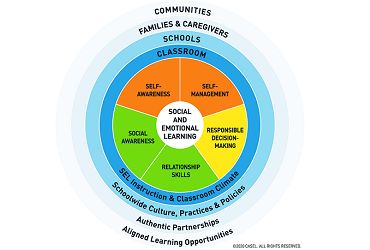Necessity of the Modern World- SEL
With the rise in the number of declining mental health in young children and adolescents, it can be stated that socio-emotional skills are the need of the hour. According to Collaborative for Academic, Social and Emotional Learning (CASEL), “Social and emotional learning (SEL) is the procedure through which children and adults learn and effectively apply the knowledge, attitudes, and skills necessary to understand and manage emotions, set and achieve positive”, personal and professional “goals, feel and express empathy for others, establish and uphold positive relationships, and make responsible decisions”, hence become productive and responsible member of the society. As long as kids are actively moving, creating, or playing, whether at home or school, they’re learning.
CASEL divides Social and Emotional Learning into five key skills.
These five competencies include-
- Self Awareness: to understand one's own emotions, values, thoughts and how they are interconnected; builds confidence in children by helping them recognise their strengths and weaknesses; gives the child a positive mindset. If a child is angry, he/she will be able to identify that this particular emotion is making their hair frizzy, their cheeks hot and their heartbeat fast.
- Self Management: to regulate one's emotions, thoughts and behaviours effectively by acting cautiously, managing stress and empathising with their feelings. The Marshmallow experiment by Walter Mischel explains self-management in a more sophisticated way. It can be concluded that children who shift their attention or follow a strategy to delay gratification, are successful compared to those who do not.
- Social Awareness: to understand feelings, perspectives and empathise with others irrespective of their social and economic backgrounds, cultures or contexts; instilling in them the understanding of social norms and behaviours. A socially aware child will be able to understand when his/her peers are sad or happy, by looking at their faces or sensing a different tone while they are talking and base his/her actions accordingly.
- Relationship Skills: to establish and maintain healthy and supportive relationships by communicating clearly, listening actively, cooperating, working collaboratively to problem solve and negotiate conflict constructively. While working on a group project, the children need to recognise their respective roles of coordinators, leaders or creators and give credit to his/her group members.
- Responsible Decision Making: to make caring and constructive choices about personal behaviour and social interactions across diverse settings. The child should know that his/her actions have consequences. For every decision they make, they have to evaluate the benefits and drawbacks. If a child finds a lost toy, he/she should be able to make a responsible decision and not slyly hold onto it.
These five key areas are promoted across different developmental phases. Studies have shown that SEL is most progressive when it begins in early childhood and continues till high school
( LeBu ffe, et al., 2009/2014). Positive social behavior fosters academic achievement. Students with SEL skills show improved academic performance (Durlak et al., 2011; Durlak and Weissberg, 2005). SEL not only helps the child with his/her present setting, but also, as the child grows, “better social and emotional skills can increase the chances of an academic success, career success, positive family and work relationships, reduced conflicts, better mental health, reduced criminal behaviour, and engaged citizenship”(e.g., Hawkins, Kosterman, Catalano, Hill, & Abbott, 2008; Jones, Greenberg, & Crowley, 2015)
A solid SEL foundation starts with strong and healthy attachments to caregivers and the ability to get his/her needs met. As the child grows, these skills are developed with the help of school staff and trained professionals through a Social Emotional Learning Curriculum. Each of these competencies is rooted in research, and research has demonstrated that they can be developed in a school setting through SEL development activities.
To implement SEL in the school curriculum it is necessary to follow a systematic approach.
RULER( Recognize, Understand, Label, Express and Regulate emotions) is one such approach formed by Yale Center for Emotional Intelligence.It incorporates the use of Emotional Intelligence in everyday life. RULER is implemented in the school community through staff and professional learning, classroom instruction and family engagement.
Its long-lasting effects help lower the rates of stress, depression, anxiety and dangerous behaviours such as drug use and prevent drop-outs, and can reduce violent behaviour and criminality. This increases the chances of the child to become successful not only in academics and extracurricular activities but also it helps in achieving personal goals- hence, constituting a “whole child”.
Children should be given opportunities to develop their soft skills for their overall development. Social and emotional skills are not inborn, unchanging qualities. Research-based evidence indicates SEL developed over time makes an established impact and results in a higher level of social and emotional skills in students. They can, and with the right support and assistance, will develop, improve and grow their social-emotional skills. Hence, it will not only make it easier for them to make rational personal decisions but also it will make them responsible and caring citizens, who will lead the world in times to come.

